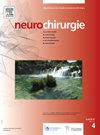Neurosurgical management of the acute phase of adult and pediatric traumatic brain injury
IF 1.4
4区 医学
Q4 CLINICAL NEUROLOGY
引用次数: 0
Abstract
Objective
To develop a multidisciplinary French framework addressing neurosurgical management in the initial phase of traumatic brain injury (TBI) in adults and children.
Design
A panel of 29 experts was formed at the request of the French Society of Neurosurgery (SFNC), with the participation of the French Society of Pediatric Neurosurgery (SFNCP), French Society of Private-Practice Neurosurgeons (SFNCL), French-Speaking Neurocritical Care and Neuro-Anesthesiology Society (ANARLF), French Society of Anesthesia, Critical Care and Perioperative Medicine (SFAR), French-Speaking Pediatric Emergency and Intensive Care Group (GFRUP), French Society of Neuroradiology (SFNR), French-Speaking Infectious Diseases Society (SPILF), and the French Society of Physical Medicine and Rehabilitation (SOFMER).
Methods
Questions were formulated using the PICO (Patients, Intervention, Comparison, Outcome) format, grouped into 7 categories: 1. Factors of poor prognosis, 2. Extradural hematoma, 3. Acute subdural hematoma, 4. Skull-base fracture and dural tear, 5. Penetrating traumatic brain injury, 6. Post-traumatic cerebrospinal fluid disorder, and 7. Pediatric specificities.
Results
Synthesis by the experts and application of the GRADE® method resulted in the formulation of 45 recommendations. Strong consensus was reached for all recommendations at the first round of rating,
Conclusion
There was a strong consensus among the experts on important interdisciplinary recommendations to improve the neurosurgical management of patients with TBI.
成人和儿童创伤性脑损伤急性期的神经外科治疗。
目的:建立一个多学科的法国框架,解决成人和儿童创伤性脑损伤(TBI)初始阶段的神经外科治疗问题。设计:应法国神经外科学会(SFNC)的要求,组成了一个由29名专家组成的小组,其中包括法国儿科神经外科学会(SFNCP)、法国私人执业神经外科医生学会(SFNCL)、法语神经危重症护理和神经麻醉学学会(ANARLF)、法国麻醉、危重症护理和围手术期医学学会(SFAR)、法语儿科急诊和重症监护组(GFRUP)、法国神经放射学会(SFNR)、法语传染病学会(SPILF)和法国物理医学和康复学会(SOFMER)。方法:采用PICO(患者、干预、比较、结果)格式进行问卷调查,问卷分为7类:1。2.预后不良因素;3.硬膜外血肿;急性硬膜下血肿,4。颅底骨折和硬脑膜撕裂,5例。6.穿透性创伤性脑损伤;创伤后脑脊液紊乱,7。小儿特异性。结果:通过专家的综合和GRADE®方法的应用,形成了45条建议。结论:专家们对改善TBI患者神经外科治疗的重要跨学科建议达成了强烈的共识。
本文章由计算机程序翻译,如有差异,请以英文原文为准。
求助全文
约1分钟内获得全文
求助全文
来源期刊

Neurochirurgie
医学-临床神经学
CiteScore
2.70
自引率
6.20%
发文量
100
审稿时长
29 days
期刊介绍:
Neurochirurgie publishes articles on treatment, teaching and research, neurosurgery training and the professional aspects of our discipline, and also the history and progress of neurosurgery. It focuses on pathologies of the head, spine and central and peripheral nervous systems and their vascularization. All aspects of the specialty are dealt with: trauma, tumor, degenerative disease, infection, vascular pathology, and radiosurgery, and pediatrics. Transversal studies are also welcome: neuroanatomy, neurophysiology, neurology, neuropediatrics, psychiatry, neuropsychology, physical medicine and neurologic rehabilitation, neuro-anesthesia, neurologic intensive care, neuroradiology, functional exploration, neuropathology, neuro-ophthalmology, otoneurology, maxillofacial surgery, neuro-endocrinology and spine surgery. Technical and methodological aspects are also taken onboard: diagnostic and therapeutic techniques, methods for assessing results, epidemiology, surgical, interventional and radiological techniques, simulations and pathophysiological hypotheses, and educational tools. The editorial board may refuse submissions that fail to meet the journal''s aims and scope; such studies will not be peer-reviewed, and the editor in chief will promptly inform the corresponding author, so as not to delay submission to a more suitable journal.
With a view to attracting an international audience of both readers and writers, Neurochirurgie especially welcomes articles in English, and gives priority to original studies. Other kinds of article - reviews, case reports, technical notes and meta-analyses - are equally published.
Every year, a special edition is dedicated to the topic selected by the French Society of Neurosurgery for its annual report.
 求助内容:
求助内容: 应助结果提醒方式:
应助结果提醒方式:


